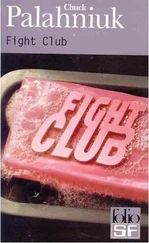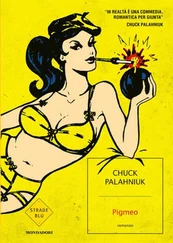Chuck Palahniuk - Fugatives & Refugees
Здесь есть возможность читать онлайн «Chuck Palahniuk - Fugatives & Refugees» весь текст электронной книги совершенно бесплатно (целиком полную версию без сокращений). В некоторых случаях можно слушать аудио, скачать через торрент в формате fb2 и присутствует краткое содержание. Жанр: Современная проза, на английском языке. Описание произведения, (предисловие) а так же отзывы посетителей доступны на портале библиотеки ЛибКат.
- Название:Fugatives & Refugees
- Автор:
- Жанр:
- Год:неизвестен
- ISBN:нет данных
- Рейтинг книги:5 / 5. Голосов: 1
-
Избранное:Добавить в избранное
- Отзывы:
-
Ваша оценка:
- 100
- 1
- 2
- 3
- 4
- 5
Fugatives & Refugees: краткое содержание, описание и аннотация
Предлагаем к чтению аннотацию, описание, краткое содержание или предисловие (зависит от того, что написал сам автор книги «Fugatives & Refugees»). Если вы не нашли необходимую информацию о книге — напишите в комментариях, мы постараемся отыскать её.
Fugatives & Refugees — читать онлайн бесплатно полную книгу (весь текст) целиком
Ниже представлен текст книги, разбитый по страницам. Система сохранения места последней прочитанной страницы, позволяет с удобством читать онлайн бесплатно книгу «Fugatives & Refugees», без необходимости каждый раз заново искать на чём Вы остановились. Поставьте закладку, и сможете в любой момент перейти на страницу, на которой закончили чтение.
Интервал:
Закладка:
One Sunday morning he was pestering the hotel residents with his relentless questions about Portland history. "I'd driven everyone out of the place with my questions except for one man who never, ever talked to me," Michael says. "I called him Captain Grump."
With his wrinkles and his scowl, Captain Grump looked at the little boy. Michael remembers, "He said, 'If you really want to know about the history of Portland, you have to go underground.'"
The old man led the boy down SW Third Avenue to the South Auditorium Urban Renewal District, where a building was being demolished with no barricades or chain-link fencing around it. Captain Grump led Michael down into the basement, to a trapdoor, then down a ladder to an old door. Michael remembers it as solid steel, heavy as the door to a bank vault. It's only now he realizes it was just an oak door covered in tin.
Behind the door was nothing but cold blackness. Michael says, "He said, 'You go through that door,' and he gave me a box of matches."
Captain Grump said, "You go straight and don't make any turns, and you'll get to the waterfront." Then he closed the door, saying, "See ya later, kid."
These were the first matches Michael had ever handled. One, then two, then three matches failed in the dark before he panicked and ran screaming out the door, crashing into Captain Grump.
Dewey Kirkpatrick was furious Michael had left the hotel with a stranger, and he agreed that if the boy would stay off the dangerous city streets, Dewey would help him explore the tunnel system. The tunnels were no longer contiguous, so to give Michael access to different sections, Dewey would move from hotel to hotel every week. "He'd sneak me past the desk clerk to get me into the underground," Michael says. But Dewey never explored the tunnels. "He had a bad leg and walked with a cane. He didn't go with me." Sometimes the hotel elevator went to the basement, sometimes they took the stairs, but they'd find some way into the tunnels that connected to each hotel. Michael went alone, and Dewey felt safe knowing the kid was off the streets.
According to Michael, the Broadway Theater, the Paramount, and the Orpheum all had connections to the tunnel system. "In the flood of 1996 and '97," he says, "a lot of places that thought they had no connections to the waterfront found out otherwise."
Since he was seven, Michael Jones has been exploring and excavating his five-mile network of shanghai tunnels. Now he leads tours to show them off. On a recent tour the Chinese Americans' Citizens Alliance sent eleven members through the tunnels and they told Jones, "Please don't change what you're doing—this is exactly the way it was."
Michael says other tourists did ask for a small modification. He says, "There were several of the old Chinese Americans who took the tour and said, 'I can feel the spirits. This place must be cleansed.'"
Michael has heard the voices of phantom men and women. He's seen only two spiders in the forty-plus years he's explored under Portland. And one cockroach, but it was a foot long, and he trapped it under a bucket because he knew no one would believe him. "It had to have come off a ship from overseas," he says. "No way was this thing locally grown."
He talks about shanghai prisoners who were locked in holding cells, left standing in water. The Ku Klux Klan met here. So did the immigrant Chinese they persecuted. Ask Michael about Nina, a prostitute who was killed for talking too much about the underground. Also ask him about cannibalism and the tunnel speakeasies of Prohibition.
During volunteer work parties every Wednesday night, members of Northwest Paranormal Investigations help Michael restore the tunnels, and they say the underground is the most haunted place in Oregon. Under the streets of Portland they say the spirit of a woman roams, searching for her kidnapped daughter. Other spirits still search for their beloved menfolk who were drugged and shanghaied onto sailing ships, never to be seen again. Still more wandering spirits died in the tunnel system and are still looking for their way out.
To see for yourself, put on some sturdy shoes and get ready to walk through the miles of low ceilings, broken furniture, and orphaned boots. You can contact Michael Jones at 503-622-4798, e-mail shanghaitunnels@onemain. com. Or write to the Cascade Geographic Society, P.O. Box 398, Rhododendron, OR 97049.
(a postcard from 2000)
Ten days before the end of the millennium, nobody I know has plans to celebrate. We've all stockpiled bottled water and canned tuna. As Y2K and the threat of global chaos gets closer—all those computers crashing—it seems a shame that everybody's staying home to guard their Sterno for New Year's Eve.
That day, an ad in the newspaper says the Bagdad Theater is still available. The Bagdad is an Arabian-style movie palace leftover from the 1920s. The theater has a print of the movie Fight Club. This is too much to resist.
Our idea is to hire a staging company to build a dance floor below the movie screen. The Bagdad is huge inside, with balconies and red-velvet seats, spooky alcoves, and fountains in the lobby. It's been restored and converted into a theater-slash-restaurant. We can hire a lighting company. Turn the place into a night club. Make it a costume party with everyone coming as their favorite person from the past century. Serve dinner to some five hundred people and have a special showing of the movie. We'd leave dozens of disposable cameras on every table so people could document the night. Dinner, dancing, prizes, it seems perfect.
We buy several thousand glowsticks to hand out, just in case. We blow up thousands of balloons, including thirty-five silver monsters, big as small cars. The staging company installs bubble-blowing machines. Special-effects lighting. The DJ is booked. The invitations go out, and we're set.
On the last day of the twentieth century, I'm on the sidewalk with a long pole, changing the marquee to read "Special Secret Party Here Tonight," and an old woman in a cloth coat asks if Fight Club has ended its run.
And I'm thinking, In your dreams. I'm thinking, Not your cup of tea, lady?
She's tiny in her coat and old-lady low heels, and she says, "I've heard very good things about it. I was really wanting to see it."
This won't be my last surprise of the century.
Some things you can't anticipate. When the huge silver balloons bounce out of the balcony, they land in everyone's dinner. From then on, they're lasagna and salad-covered blimps, bouncing against everyone, picking up and smearing food on everything they touch. Bottles and wineglasses fall and break, and the moment a six-foot silver balloon covered with food lands in the broken glass— boom —chicken and tomato sauce fly everywhere.
My relatives leave, quickly and politely, before midnight. This is about the same time a group of airline flight attendants rip off their uniforms on the dance floor and starting licking each other's bare chests.
A few minutes before midnight, our special clock for the occasion, it stops.
All of this I find out secondhand. All evening, I'm in the lobby welcoming people or saying good night. Famous people get drunk and fight. Gandhi is stalking Ava Gardner. Hirohito is French-kissing Chairman Mao. There's a three-way between Hugh Hefner and Judy Garland and Albert Einstein happening somewhere in the balcony. Somewhere else, Emma Goldman is smoking dope. Then Ray Bolger leaves, weeping her eyes out. Rosie the Riveter is dancing on a table. People appear and disappear, spattered with tomato sauce and laughing. Every wineglass the restaurant owns gets broken. Every votive candle in a glass holder gets broken. On top of all this mayhem, the bubble machines just keep blowing down bubbles. People dance. The movie plays.
Читать дальшеИнтервал:
Закладка:
Похожие книги на «Fugatives & Refugees»
Представляем Вашему вниманию похожие книги на «Fugatives & Refugees» списком для выбора. Мы отобрали схожую по названию и смыслу литературу в надежде предоставить читателям больше вариантов отыскать новые, интересные, ещё непрочитанные произведения.
Обсуждение, отзывы о книге «Fugatives & Refugees» и просто собственные мнения читателей. Оставьте ваши комментарии, напишите, что Вы думаете о произведении, его смысле или главных героях. Укажите что конкретно понравилось, а что нет, и почему Вы так считаете.




